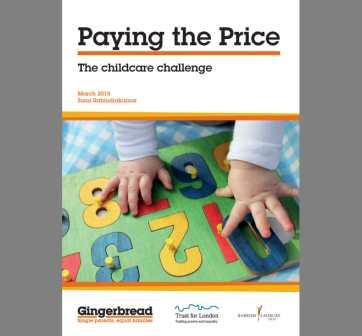Sumi Rabindrakumar, Gingerbread’s Research Officer, blogs about Gingerbread’s new report on childcare which highlights the need to make work pay for low income families
The cost of childcare has increasingly made the headlines of late, striking a chord with many parents. For single parents, this is a particular worry; as the main carer for their children, they rely on childcare to ensure they can juggle the demands of work, care and the unpredictable events life throws up.
Gingerbread’s new research shows that single parents’ childcare arrangements can involve a complex patchwork of different providers to keep costs down and make ends meet. And it often means relying on unsustainable or unreliable ways to manage caring responsibilities, from elderly parents to low-paid self-employment.
“If it wasn’t for my parents and sister, I would have to give up work.”
Will universal credit help?
New support for low income families – increasing support from 70 to 85 per cent of childcare costs – was initially restricted to families on Universal Credit who paid income tax. After campaigning by Gingerbread and other groups, the proposal was extended to all families on Universal Credit. The total cost of this policy is around £400 million – not a sum to be sniffed at, and certainly welcome relief for many parents, as shown by Donald Hirsch’s analysis for our report. But a number of things shouldn’t be overlooked about this extra support:
- It comes on the back of a cut in childcare support for low income families in 2011 (from 80 to 70 per cent of costs); single parents have been under significant financial strain as a result
- It will only be introduced from 2016 – six months after higher income families will see additional support in the form of ‘tax-free’ childcare
- It is only available under Universal Credit – most single parents are some way off transferring to this new benefit and will, in the meantime, be stuck on the lower level of support
- Work still won’t make economic sense for parents with high childcare costs. As they increase their work hours, and as a result childcare bills, costs are likely to exceed the cap on fees eligible for support; these losses are even greater for low-paid single parents
- Many – if not most – single parents will still be short of a decent income, as measured by members of the public, particularly those working part-time or on a low wage.
“I cannot afford to go back to work full-time and cover rent and childcare. Every day I worry about money”
Making work pay
Single parents are struggling now. Around half of single parents surveyed have borrowed money to cover childcare payments in recent years. Many single parents who want to work can’t. Only one in ten single parents surveyed said childcare was not a barrier to apply for or to take up a job. The Government has made a clear commitment to ‘make work pay’. We know the income struggles of single parents won’t be solved by childcare policy alone, but it forms a big part of the jigsaw. That’s why we’re calling for urgent action – to ensure additional support is brought forward, for all low income families regardless of whether they’re on Universal Credit or tax credits – and to increase the cap on support to reflect soaring childcare costs over the past decade.
In fact, as our report shows, making childcare policy more effective could mean work pays for both parents and the state, if it gets people paying more in taxes. With a new government on the horizon, now is the time for a clean slate on childcare policy. We need a system that is coherent, affordable and works for all parents. Rolling out a policy undermined by outdated limits and high childcare costs does both struggling parents and the wider economy no good at all.
“I got myself educated, and into a career; I saved money instead of spending frivolously. Yet there is no way that I can break even, whether I work or not…I can be let go from the job at a week’s notice, but I’ll still be liable for six weeks of nursery payments.”
‘Paying the Price’ is a research project being carried out by Gingerbread, with funding from Trust for London and Barrow Cadbury Trust. ”The childcare challenge’ is the third report from the project; Read Donald Hirsch’s supporting paper.

